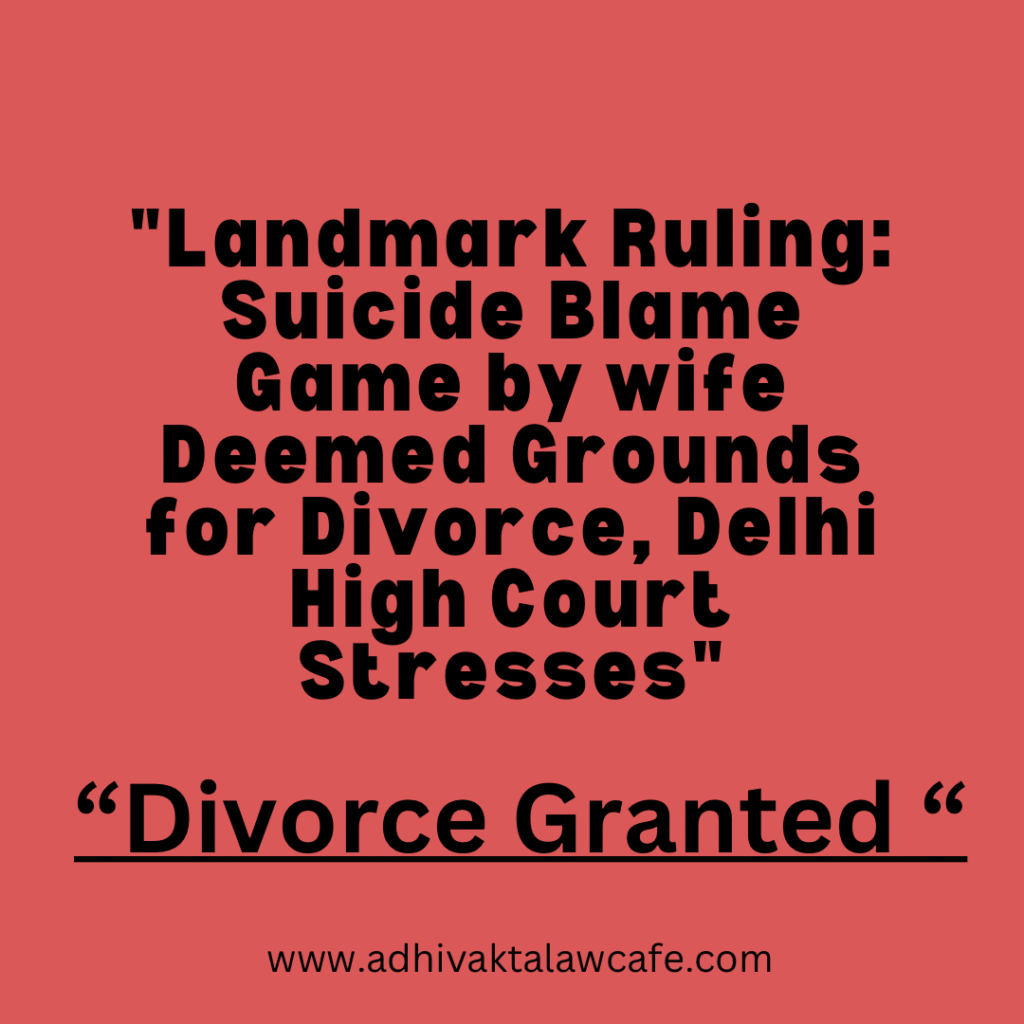“Divorce Grounds Strengthened: Delhi High Court Decrees Suicide Blame Game by Wife as Extreme Cruelty”
The Delhi High Court has emphasized that a wife’s attempt to shift blame onto her husband for a suicide attempt constitutes extreme cruelty and serves as a legitimate ground for divorce. The court noted that such behavior places the husband and his family in constant jeopardy of facing false accusations.
The recent observation by the Delhi High Court underscores the gravity of a wife’s actions when attempting suicide and subsequently attempting to accuse her husband and in-laws. Such conduct is deemed as not only extreme cruelty but also as a valid basis for seeking a divorce. This ruling highlights the potential harm and threat of false allegations that the husband and his family may face due to such actions.

An Appeal under Section 19 of Family Court Act, 1984 read with
Section 28 of the Hindu Marriage Act, 1955, (hereinafter referred to as
“HMA, 1955”) has been filed on behalf of the appellant/wife (Respondent in
the Divorce Petition) against the Judgment dated 08.12.2021 of the learned
Addl. Principal Judge, Family Court, granting divorce on the ground of
cruelty in a petition filed by the respondent/husband (Petitioner in the
Divorce Petition) under Sections 13(1)(ia) of HMA, 1955.
the appellant in her testimony had admitted that she had
consumed the poison i.e. Allout liquid on her own and at the relevant time
the respondent was at his place of work.
“Supreme Court Contempt Notice: Magistrate Defies Apex Court’s Bail, Sparks Legal Showdown”
The repeated threats to commit suicide and the attempt to commit suicide was held to be an action amounting to cruelty by the Supreme court in the case of Pankaj Mahajan Vs. Dimple, (2011) 12 SCC. It was further observed that cruelty postulates a treatment of a spouse with such cruelty
that it would be harmful or injurious to live with the other spouse. Similarly in Narendra Vs. K. Meena (2016) 9 SCC 455, it was observed that in case the wife succeeds in committing suicide, one can only imagine how the poor husband would get entangled into the clutches of law which would virtually
ruin his sanity, peace of mind, career and probably his entire life. Such threat of attempting suicide amounts to cruelty.
In the present case as well, the conduct of the appellant is clearly is an act of cruelty towards the respondent/husband. The learned Family Judge, therefore, concluded that the respondent had been treated with cruelty and the divorce was granted.
In the case of K. Srinivas Vs. K. Sunita (2013) 5 SCC 226, the Hon’ble Supreme Court held that filing of false complaints against the husband and his family members constitutes mental cruelty for the purpose of Section 13 (1) (ia) of the Hindu Marriage Act. It was further observed that filing appeals questioning the acquittal of the husband indicates the relentless attempts of the wife to somehow ensure that the husband and his family are put in jail. Such acts, without a doubt, amount to cruelty.
The Supreme Court in Mangayakarasi v. M. Yuvaraj (2020) 3 SCC 786, observed that an unsubstantiated allegation of dowry demand or such
other allegations made against the husband and his family members exposed them to criminal litigation. Ultimately, if it is found that such allegations were unwarranted and without basis, the husband can allege that mental cruelty has been inflicted on him and claim a divorce on such a ground
The bench of justice NEENA BANSAL KRISHNA & SURESH KUMAR KAIT observed that during the two years of their matrimonial life, the parties barely resided together for ten months in all and even during that time there were various acts of the cruelty of being subjected to false complaints and civil as well as criminal litigation, committed by the appellant towards the respondent. Court also said that therefore, conclude that the learned Addl. Principal Judge, Family Court has rightly held that the respondent was subjected to cruelty by the appellant and granted divorce under Section 13 (1)(ia) of the HMA.
Delhi High Court find no merit in the appeal, which along with the pending applications if any, is hereby dismissed.
Description :-
“Uncover new divorce grounds as Delhi High Court declares blaming spouses for suicide attempts as extreme cruelty. Explore the legal implications and protect your family’s rights.”
“Discover a groundbreaking legal precedent: Delhi High Court rules that a wife’s attempt to blame her husband for a suicide bid is deemed extreme cruelty, solidifying grounds for divorce. Dive into the implications of this landmark decision on false accusations and family dynamics.”
“Recent legal developments have brought to light a significant shift in divorce grounds. The Delhi High Court has made a landmark declaration, considering the act of blaming spouses for suicide attempts as an extreme form of cruelty. In this article, we delve into the details of this groundbreaking ruling, exploring the legal implications and discussing how it can impact the rights of individuals and families. Understanding these new divorce grounds is crucial for anyone navigating the complexities of family law.“
Judgement